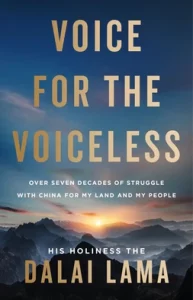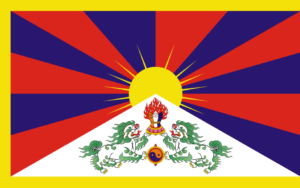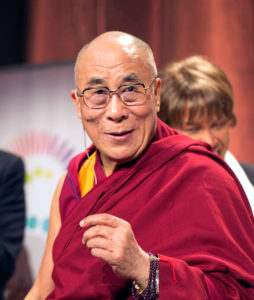 In his recent book “Voice of the Voiceless,” the Dalai Lama has reaffirmed his stand on the issue of his reincarnation and succession—a matter that has long been a source of tension between him and the Chinese government. His comments in the book have again brought the issue to the forefront, highlighting the ongoing clash between the Tibetan spiritual leader and the ruling Chinese Communist Party.
In his recent book “Voice of the Voiceless,” the Dalai Lama has reaffirmed his stand on the issue of his reincarnation and succession—a matter that has long been a source of tension between him and the Chinese government. His comments in the book have again brought the issue to the forefront, highlighting the ongoing clash between the Tibetan spiritual leader and the ruling Chinese Communist Party.
The Dalai Lama explicitly states in the book that his reincarnation will not occur in China or Tibet under Chinese rule. He will be reborn in a free world, away from the Chinese Communist Party’s control. This is a significant statement because it directly challenges China’s desire to assert authority over the reincarnation process, a system the Chinese government has attempted to control for decades.
His Holiness urges his followers to reject any successor that is chosen by the Chinese government. This is a crucial point in the ongoing dispute. China has made several moves to control the process of selecting the next Dalai Lama, and his Holiness has for long resisted this interference. The Dalai Lama’s spiritual authority, he believes, should remain independent of political control, particularly that of a regime that has heavily repressed Tibetan culture and religion.
 In a statement about his reincarnation he also raises questions about the future of the Dalai Lama Institution. By stating that he will be reborn in a free world, he reaffirms his commitment to ensuring that the Dalai Lama tradition continues its traditional role of advocating for human rights and spiritual leadership. He suggests that his future reincarnation will help preserve the spiritual autonomy of the Tibetan people and continue their fight for freedom and justice in the face of ongoing repression.
In a statement about his reincarnation he also raises questions about the future of the Dalai Lama Institution. By stating that he will be reborn in a free world, he reaffirms his commitment to ensuring that the Dalai Lama tradition continues its traditional role of advocating for human rights and spiritual leadership. He suggests that his future reincarnation will help preserve the spiritual autonomy of the Tibetan people and continue their fight for freedom and justice in the face of ongoing repression.
The Dalai Lama’s remarks in the book underscores the growing conflict between Tibet’s spiritual leadership and the Chinese Communist Party. Beijing has consistently sought to assert control over the process of selecting religious leaders in Tibet, including the Dalai Lama’s successor. This is seen as a ploy to maintain political influence over Tibet and undermine the Tibetan struggle for autonomy.
The Chinese government’s claim that it has the right to select the next Dalai Lama is viewed by the Dalai Lama and many Tibetans as an infringement on religious freedom and the cultural sovereignty of the Tibetan people. This has led to significant tensions between Tibetans in exile, particularly in India, and China, with the Dalai Lama being a powerful symbol of Tibetan resistance.
 The Dalai Lama’s message in the book reflects his enduring belief in the power of the ‘Dalai Lama Institution’ as a force for good in the world. He envisions his reincarnation as a voice for the oppressed, an advocate for human rights, and a protector of Tibetan culture and Buddhist teachings.
The Dalai Lama’s message in the book reflects his enduring belief in the power of the ‘Dalai Lama Institution’ as a force for good in the world. He envisions his reincarnation as a voice for the oppressed, an advocate for human rights, and a protector of Tibetan culture and Buddhist teachings.
The Chinese government views the Dalai Lama as a major obstacle to its control over Tibet, and is likely to be angered by such statements. For Beijing, the Dalai Lama is seen not only as a spiritual figure but as a political leader advocating for Tibetan autonomy, which it views as a threat to national unity. The Dalai Lama’s comments continue to attract international attention, as they highlight the struggle for religious freedom in Tibet and China. His call for the ‘Dalai Lama Institution’ to be maintained in a free world could galvanize international support for the Tibetan cause, particularly in the context of global movements advocating for human rights and religious freedom.
The Dalai Lama’s vision for his reincarnation outside of China and Tibet may have long-term consequences for the Tibetan identity and the future of the Tibetan Buddhist tradition. Should the Dalai Lama’s reincarnation occur outside Tibet, it could symbolise a shift in the Tibetan struggle, where the Tibetan people’s religious and cultural heritage is maintained in exile and outside the influence of Chinese Communist rule.
“Voice of the Voiceless,” is not only a spiritual work but also a political statement that addresses the future of the ‘Dalai Lama Institution’ in the face of Chinese interference. By affirming that his reincarnation will be outside China and Tibet, he reaffirms his commitment to the Tibetan people’s freedom and spiritual independence. His followers are encouraged to reject any Chinese-appointed successor, and the focus on his reincarnation will undoubtedly continue to be a point of tension between Tibetan Buddhism and the Chinese government. The book has further illuminated the Dalai Lama’s intentions to ensure that his legacy and the cause of Tibet continue in a free world.



